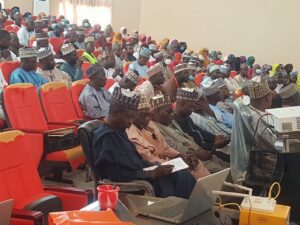IMAN holds 23rd National AGM, Conference in Sokoto
• Calls on Muslim girls to choose health-related careers
The Islamic Medical Association of Nigeria (IMAN) has held its 23rd National Annual General Meeting and Scientific Conference, with 521 delegates in attendance from across all geopolitical zones, including the Federal Capital Territory (FCT), Abuja.
The programme which ran for five days between December 5th and 10th took place at the Sultan Maccido Institute for Qur’an and General Studies in Sokoto, Northwest Nigeria.
The theme was “Achieving Universal Health Coverage: Roles of the Muslimah Healthcare Professionals”.
In a communique signed by the President and Secretary of IMAN respectively, Prof. Ibrahim Oreagba and Dr. Abdurrasheed Nasir, a copy of which was made available to Muslim News, the body lamented the poor participation of Muslim women in the healthcare industry, encouraging them to take courses and careers in health-related fields.
The opening ceremony was graced by Sokoto State Governor, Rt. Hon. Aminu Waziri Tambuwal, CFR, represented by his Special Adviser on Public Health, Alhaji Muhammad Bello Umar Dogondaji and the Sultan of Sokoto and President General, Nigerian Supreme Council of Islamic Affairs, represented by Sarkin Sudan Wurno, Alhaji Kabir Chigari.
Dignitaries who attended the programme also include, Commissioner of Health Sokoto State, Dr. Muhammad Ali Inname, represented by Alh. Buhari Shehu; Executive Director, Hospital Services Management Board, Hon (Dr.) Balarabe Shehu Kakale; Chief Medical Director, Usmanu Danfodio University Teaching Hospital, Sokoto, Prof. Ahmad Anas Sabir, represented by Chairman Medical Advisory Committee UDUTH, Sokoto, Dr. Aliyu Shehu Malami.
Others were: Provost, College of Health Science, UDUS, Prof. S A. Saidu; Vice Chancellor Usman Dan Fodio University (UDUS), Prof. L S. Bilbis, who was the chairman of the occasion, represented by Deputy Vice Chancellor Academics, Prof. M G. Mahuta.
One of the highlights of the programme was the pre-conference activities which included: the 7th addiction prevention workshop; the 6th youth camp/leadership training program on building effective leadership; among others.

IMAN also organised free medical and surgical outreaches in various communities of the state, where over 549 patients were treated for various medical conditions.
Muslim News gathered that 94 cataract extractions were also conducted at no cost to the beneficiaries, as the surgeries continue with more than 100 eye cataract cases awaiting extraction.
A major highlight of the conference was the presentation of Lifetime Achievement Awards to the founding President of IMAN, Professor Abdulfatai Biola Mabadeje and the founding National Secretary, Professor Ibrahim Abdu-Aguye.
A total of 30 scientific abstracts and 6 lead papers were presented on the theme and subthemes of the conference.
At the end of the deliberations, participants at the conference made the following recommendations, part of which focused on empowering female Muslims to take health-related careers.

• There is an urgent need to intensify career guidance and counseling with specific focus on encouraging younger ones, specifically, the females to choose medical and health courses for their careers;
• Increased advocacy in the public space to encourage parents and families to support their female wards to pick up careers in health-related fields;
• The Universal Healthcare Plan should provide new policies that are friendly to Islamic ethos;
• There is need to include in the healthcare curricular, the tremendous contributions made by early female Muslims;
• More efforts (policies, prayers, attitudinal change and returning to Allaah in all our affairs) should be made by all stakeholders to roll back terrorism and its impacts on peoples’ health and religion in Nigeria:

• The need for government and relevant agencies including faith-based organizations to change the poor public perceptions about female healthcare workers identified as one of the main causes of unstable homes and at worst, divorce, by engaging all critical stakeholders including the female healthcare workers to appreciate the sacrifices and contributions of our female healthcare providers to healthcare delivery;
• Government and faith-based organizations should help promote the understanding of Zakaat and Waqf, and help channel both to financing healthcare for Muslims and other members of the Society;
• Operators of IMAN cooperatives need to build their capacities in adhering to auditing policy and a change of attitude and practice to that which supports fixed proportions for investment and loan;
• There is a need for increased awareness and capacity of healthcare providers on the features and non-pharmacological management of psychological trauma;
• Improving the knowledge and skills of youths on effective leadership through more Youth Leadership Camps and Trainings.






